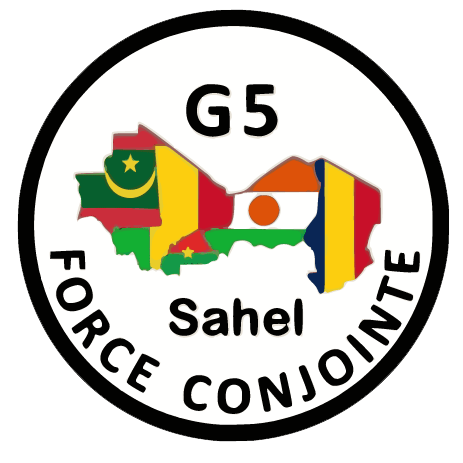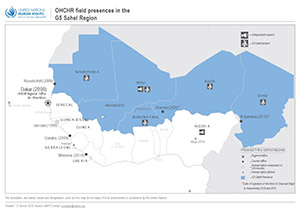Project supporting the G5 Sahel Joint Force with Implementation of the Human Rights and International Humanitarian Law Compliance Framework
Background
The G5 Sahel Joint Force (la Force conjointe du G5 Sahel "FC-G5S") was established in 2017 to respond to the expansion of armed and violent extremist groups and to the deteriorating security situation in the region. The Heads of States of the G5 Sahel countries (Burkina Faso, Chad, Mali, Mauritania, and Niger) launched this initiative to enhance the safety and security of their populations and to ensure a favourable environment for the socio-economic development of the region by pooling and multiplying their national efforts to fight against common security threats.
The compliance framework approach
The Compliance Framework is an innovative package of concrete, systematic and mutually reinforcing measures and mechanisms to prevent, mitigate and address international human rights law and international humanitarian law (IHL) violations that could be committed by security forces. It is designed as a risk reduction framework to prevent civilian harm in the conduct of offensive military operations, including counter-terrorism operations.
OHCHR support to the compliance framework
United Nations Security Council Resolution 2391 (2017) called on the G5 Sahel States to "establish a robust compliance framework to prevent, investigate, address and publicly report violations and abuses of human rights law and violations of international humanitarian law related to the FC-G5S". A Technical Arrangement signed on 23 February 2018 between the United Nations, the European Union, and the G5 countries defines the framework and outlines the roles and responsibilities of the different stakeholders in its establishment.
 In support of and in collaboration with G5 Sahel countries, OHCHR designed a compliance framework, that is tailored to the operational environment of the FC-G5S. OHCHR provides direct support to the FC-G5S to operationalize and implement the measures and tools to reduce civilian harm and respond to violations.
In support of and in collaboration with G5 Sahel countries, OHCHR designed a compliance framework, that is tailored to the operational environment of the FC-G5S. OHCHR provides direct support to the FC-G5S to operationalize and implement the measures and tools to reduce civilian harm and respond to violations.
Drawing on its expertise in UN peace operations and the work with the African Union related to the AU human rights compliance framework, OHCHR provides technical assistance on measures to mainstream human rights and the protection of civilians in the planning and conduct of operations and to develop human rights and IHL compliant rules and regulations of the FC-G5S. Through joint visits and reviews with the FC-G5S and G5 Sahel organs, OHCHR also supports the development of a common understanding of the challenges and solutions related to the implementation of the compliance framework.
Alongside this technical support, OHCHR continues to implement its mandated activities in the Sahel region on human rights monitoring and reporting; including through the deployment of dedicated human rights officers in all five countries. This function is coupled with engagement with the FC-G5S and dialogue to support national authorities' efforts to address violations and ensure their non-recurrence.
Protection and operational dividends of the compliance framework
- Contributes to achievement of military objectives - Contributes to the FC-G5S achievement of its military objectives.
- Enhances protection of civilians - Increases security forces' awareness of the impact of their operations on civilians and enhances their professionalism to prevent civilian harm, contributes to the accountability of troops in case of violations.
- Translates international legal obligations into practice - Translates international legal obligations into measures and mechanisms that can be readily understood and implemented in military contexts.
- Promotes national ownership - Promotes national ownership as it operates through direct implementation by regional / national military and security forces.
- Provides an adaptable model enabling long-term support - Offers a model that can be contextualized to operational challenges and contributes to capacity building both within and across joint military operations.
- Enables united nations engagement - Integrates human rights at the core of the UN Secretary-General's strategy on peace and security, enabling UN political and logistical engagement in risky regional operations.
- Enables coordination of partners - Enables better coordination of technical actors contributing directly or indirectly to its establishment and implementation and improving the impact of their activities.
Pillars of the compliance framework
The Human Rights and International Humanitarian Law Compliance Framework of the G5 Sahel Joint Force is composed of seven pillars:
Pillar 1 - Screening and Selection : The FC-G5S and its participating countries identify the suitability of units and personnel, to avoid deploying those involved in human rights violations and criminal conduct in the past while ensuring an increased deployment of female military personnel.
Pillar 2 - Training: The FC-G5S and participating national armed forces adopt a common training curriculum and methodology in providing pre-deployment and specialized training to the personnel of the FC-G5S (both military and police) on relevant areas of the Compliance Framework: human rights law, international humanitarian law, international refugee law, gender, protection of civilians (PoC), etc. The preparation and delivery of such trainings is coordinated with relevant partners.
Pillar 3 – Adoption and dissemination of Rules and Regulations: The FC-G5S and its participating national armed forces draft, adopt, disseminate and apply rules, regulations, standard operating procedures, and other guiding documents that govern the conduct of military operations and personnel, drawing on best practices and lessons learned from other operational environments. The rules and regulations concern among others, the use of force, including specific protection for women, children, sources, witnesses as well as victims. Other sets of regulations concern the detention, interrogation and transfer of suspects apprehended during operations.
Pillar 4 – Integration of Human Rights and PoC requirements into the planning and conduct of operations: The FC-G5S and its participating national armed forces integrate Human Rights and PoC requirements into the overall planning, conduct and evaluation of military operations r as spelt out in international human rights instruments and international humanitarian law. This includes the setting up of coordination mechanisms with civilian and humanitarian actors.
Pillar 5 – After-action reviews: Mechanisms are established to conduct after-action reviews in relation to the conduct of military operations by the FC-G5S in order to assess the impact of such operations on civilians. Recommendations emanating from After-action reviews are meant to address the negative consequences of those operations and adapt their modus operandi for future military interventions.
Pillar 6 - Monitoring and Reporting on military operations: The FC-G5S and its participating national armed forces establish internal monitoring and investigation mechanisms to track, identify, analyze and respond to casualties including incidents involving civilians. The FC-G5S and its participating national armed forces report on the implementation of the Compliance Framework.
Pillar 7 - Mechanisms and procedures to ensure accountability for human rights violations: OHCHR in collaboration with the FC-G5S and its participating countries develop and implement effective monitoring and investigation mechanisms that track, verify and establish responsibility for allegations of international human rights and IHL violations in order to hold perpetrators within the FC-G5S accountable. These include the operationalization of a police component, the potential suspension of individuals or units allegedly involved in violations, effective media communication on allegations and investigations, as well as longer-term actions. In addition, OHCHR is mandated to draft and publish reports accordingly.
